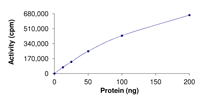
PKD2 (G848E), Active(P76-12BG)
FOR BULK ORDER REQUESTS PLEASE CONTACT US
Description :Recombinant full-length human PKD2 (G848E) was expressed by baculovirus in Sf9 insect cells using an N-terminal GST tag.
Species :Human
Tag :GST tag
Expression System:Sf9 insect cells using baculovirus
Sequence :Full length (G848E)
Genbank Number :NM_016457
Specific Activity :Sample Kinase Activity Plot. For specific information on a given lot, see related technical data sheet.
Purity :Sample Purity Data. For specific information on a given lot, see related technical data sheet.
Storage, Stability and Shipping :Store product at –70oC. For optimal storage, aliquot target into smaller quantities after centrifugation and store at recommended temperature. For most favorable performance, avoid repeated handling and multiple freeze/thaw cycles.
Applications :Kinase Assay
Molecular Weight :~130 kDa
Gene Aliases :HSPC187; nPKC-D2; PRKD2
Scientific Background :PKD2 or polycystic kidney disease 2 is a member of the polycystin protein family which is a multi-pass membrane protein that functions as a calcium permeable cation channel, and is involved in calcium transport and calcium signaling in renal epithelial cells. PKD2 interacts with polycystin 1 and this complex may be partners in a common signaling cascade involved in tubular morphogenesis. PKD2 may function as a chaperone-like molecule, which may prevent ERAD of PKD2 (1). PKD2 form an interaction network with PKD1 as the rate-limiting component (2)
References :
1. Gao, H.et.al: PRKCSH/80K-H, the protein mutated in polycystic liver disease, protects polycystin-2/TRPP2 against HERP-mediated degradation. Hum. Molec. Genet. 19: 16-24, 2010.
2. Fedeles, S. V.et.al: A genetic interaction network of five genes for human polycystic kidney and liver diseases defines polycystin-1 as the central determinant of cyst formation. Nature Genet. 43: 639-647, 2011.
Product Sheets (By Lot #) :
Research Areas :Apoptosis/Autophagy, Cardiovascular Disease, ERK/MAPK Pathway, Neurobiology, NfkB Pathway, PKA/PKC Pathway, Ser/Thr Kinases, Neurobiology, Cardiovascular Disease, ERK/MAPK Pathway, NfkB Pathway, PKA/PKC Pathway, Apoptosis/Autophagy, Ser/Thr Kinases
